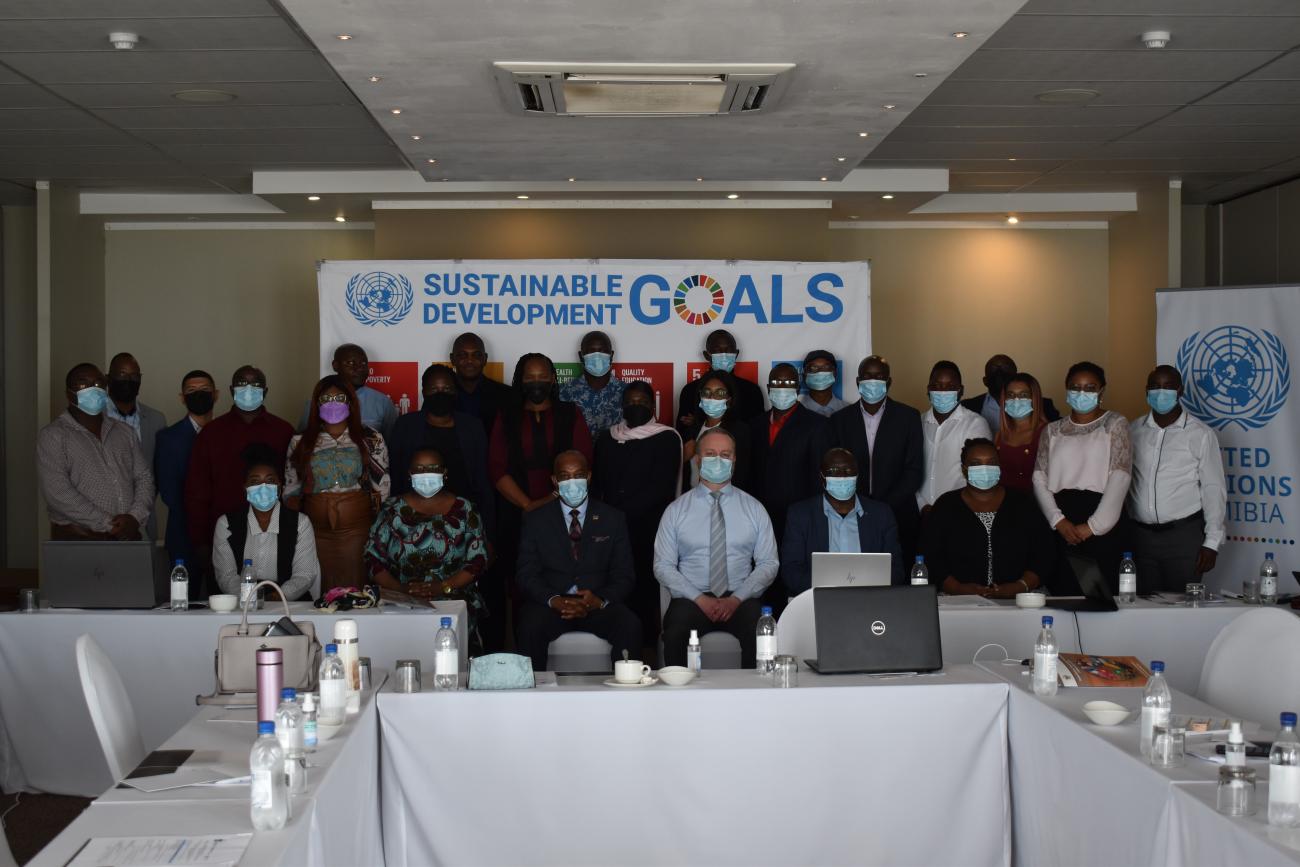Namibia, following consultations and under the coordinating leadership of the National Planning Commission (NPC) successfully conducted the Launch and Induction Workshop of the Capacity Development Project to Support Coherence in Policy Formulation through the Climate Land Energy and Water Systems (CLEWs) Initiative to Strengthen the Agriculture Sector in Namibia from 7-9 February 2022, in Swakopmund.
CLEW is a modelling tool for simultaneous consideration of policy issues pertaining to food, energy and water security, in the context of sustainable development. CLEWS in Namibia is being designed to help identify and quantify the trade-offs and synergies that may exist in simultaneous pursuit of policy goals, pertaining to food, energy and water security, in the context of sustainable development. It can thus provide an analytic basis for a coherent and cohesive process for strategy and policy formulation. CLEWs models are designed to assess how production and use of resources may contribute to climate change, and how climate change may affect these resource systems, affecting agricultural productivity.
The agriculture sector features significantly in the recently launched HPP2 under the Economic Advancement Pillar, GOAL 2 Enhance Productivity of Priority Economic Sectors, Activity 3. Unlock the economic potential of the Agricultural sector. This accentuates the importance of having reliable comprehensive synthesized information to guide sound decision-making, for the sector.
The CLEWS Initiative supports the implementation of Activity 1.2.1 “Strengthen the design and implementation capacities of government institutions at all levels in the area of productivity of agriculture, MSMEs, value chains” under the Economic Progression Pillar of the United Nations Partnership Agreement Framework (UNPAF), jointly with the UN.
It is envisioned that the CLEWS integrated assessment and institutional arrangements will inform Namibia’s 6th National Development Planning (NDP) process and offer timely support for the implementation of the recommendations in Namibia’s Nationally Determined Contribution (NDC) towards climate action.
In his Opening Remarks speaking on behalf the of Executive Director of the NPC, Mr. Ned Sibeya, the Director for Development Partners’ Coordination, at the NPC, noted that “the induction workshop will enable policy/decision makers in proposing and developing coherent institutional arrangements that would be embedded in the Namibian government in support of the development of integrated policies for CLEWS. The institutional arrangements could include aspects varying from the selection of intervention types of coherence promotion, data interoperability, budget-related aspects/ financial alignment or financing for integrated policies or human resources capacities/ competencies. The approach will instill national ownership towards addressing national priorities.”
During his Remarks, Mr. Sen Pang expressed that “CLEWS initiative will highlight the importance of policy coherence and the importance of pursuing integrated approaches to planning and policy, for example. managing trade-offs and synergies. It will support Government priorities including optimizing stewardship of natural resources and public assets; enhance productivity, energy supply security, water supply security, climate action, agricultural development. CLEWs will help explore the impact of technology choice and change, and strong institutional arrangements in achieving sustainable development.”
In her Closing Remarks, Ms. Farayi Zimudzi, UN Food and Agriculture Organization (FAO) Country Representative in Namibia, expressed that “Last year in 2021 Namibia just completed its Second Voluntary National Review (VNR) Report on the Implementation of the Sustainable Development Goals Towards Agenda 2030, which means we have a very recent introspection on our progress as a country on the various pertinent objectives and priorities. This provide some fresh information, which can be used as baseline input into the CLEWs model. NDP5 is about to run its course and the country is working on developing NDP6 that opens up the best opportunity to utilize the strengths of the CLEWs methodology, which is to provide an analytic basis for a coherent and cohesive process for strategy and policy formulation.”
One of the recommendations of the country’s second Voluntary National Review (VNR) is the development of a Roadmap for the implementation of the SDGs, including strengthening related coordination mechanisms for enhanced coherence towards 2030.
The Namibia CLEWS Technical Committee agreed on the next steps of implementation as per the workplan. This Committee so far comprises representatives from the following: Ministry of Agriculture Water and Land Reform (MAWLR); Ministry of Environment, Forestry and Tourism (MET); Ministry of Mines and Energy (MME); the National Planning Commission (NPC); the National Statistics Agency (NSA); and Academia (Namibia University of Science and Technology and University of Namibia).
Delivering as One (DaO), UN Agencies including UN Namibia, UNDESA, UNECA, UNDP, FAO, WFP are supporting the Government and development partners, in the implementation.
For additional information please contact:
- Ms. Taleni Mabakeng, Chief National Development Advisor, National Planning Commission –NPC (TMabakeng@npc.gov.na )
- Mr. Gebhardt Tjiho, National Programme Officer, FAO Namibia (Gebhardt.Tjiho@fao.org)
- Ms. Eunice Ajambo, Economist & National Development Coordination Officer, UN Namibia (ajambo@un.org )









